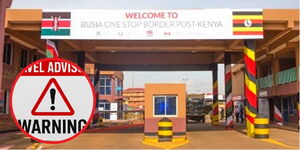Immigration Principal Secretary Julius Bitok on Sunday night explained that the process of rolling out Maisha Namba cards was in full force, likely delaying the issuance of identification cards.
Speaking in an interview with Citizen TV, the PS revealed that in the last few months since the rollout kicked off, over 800,000 cards had already been issued to applicants.
He noted that the State was in the process of phasing out old IDs explaining that any new applicants receive the new chip-enabled Maisha Card.
For months, however, concerns had been raised by Kenyans over the inclusion of an expiry date on the new digital IDs.
In response, Bitok explained that all cards containing a chipset must operate under an expiring timeline in line with international standards.
"It has an expiry date because just like other technology, you know, it has a chip. Just like the cards from the bank, it has to have an expiry date because reading that chip expires with time. It is not forever. Also, that helps us clean our database so that the transition is very important," he stated.
"It (expiry date) is also what is required internationally. You cannot have a document that lasts forever. It has to have an isolated period of time."
The PS further explained that the rollout was causing delays due to the multifaceted nature of the Maisha Namba ecosystem.
Bitok revealed that the ecosystem has four levels covering an individual's entire lifetime from birth.
"For IDs, we have a new ecosystem called Maisha Namba ecosystem. Maisha Namba is a four-in-one arrangement where you have Maisha Namba issued by civil registration at birth. That is a number that takes you through your lifetime. It becomes your primary school number, secondary school number, ID Number, and KRA (Kenya Revenue Authority) PIN," he explained.
The PS noted that the second level involves the issuance of hard copies of the cards, 800,000 of which have been given out.
"The third level is the Maisha Digital ID. If you do not want to carry your card, you can carry your phone and it's uploaded on there. It is a virtual version of the Maisha Card," he clarified.
"The fourth is the IPRS which we have rebranded to Maisha Integrated Database. It is a database of the entire record of who lives and resides in the republic of Kenya including those born in Kenya, those who have turned 18, those who have immigrated to Kenya, and the refugees. It is connected to education, health, and KRA."
After months of contestation against the rollout of the new identification card, the state was allowed by the courts to issue Maisha Namba cards in February this year.












